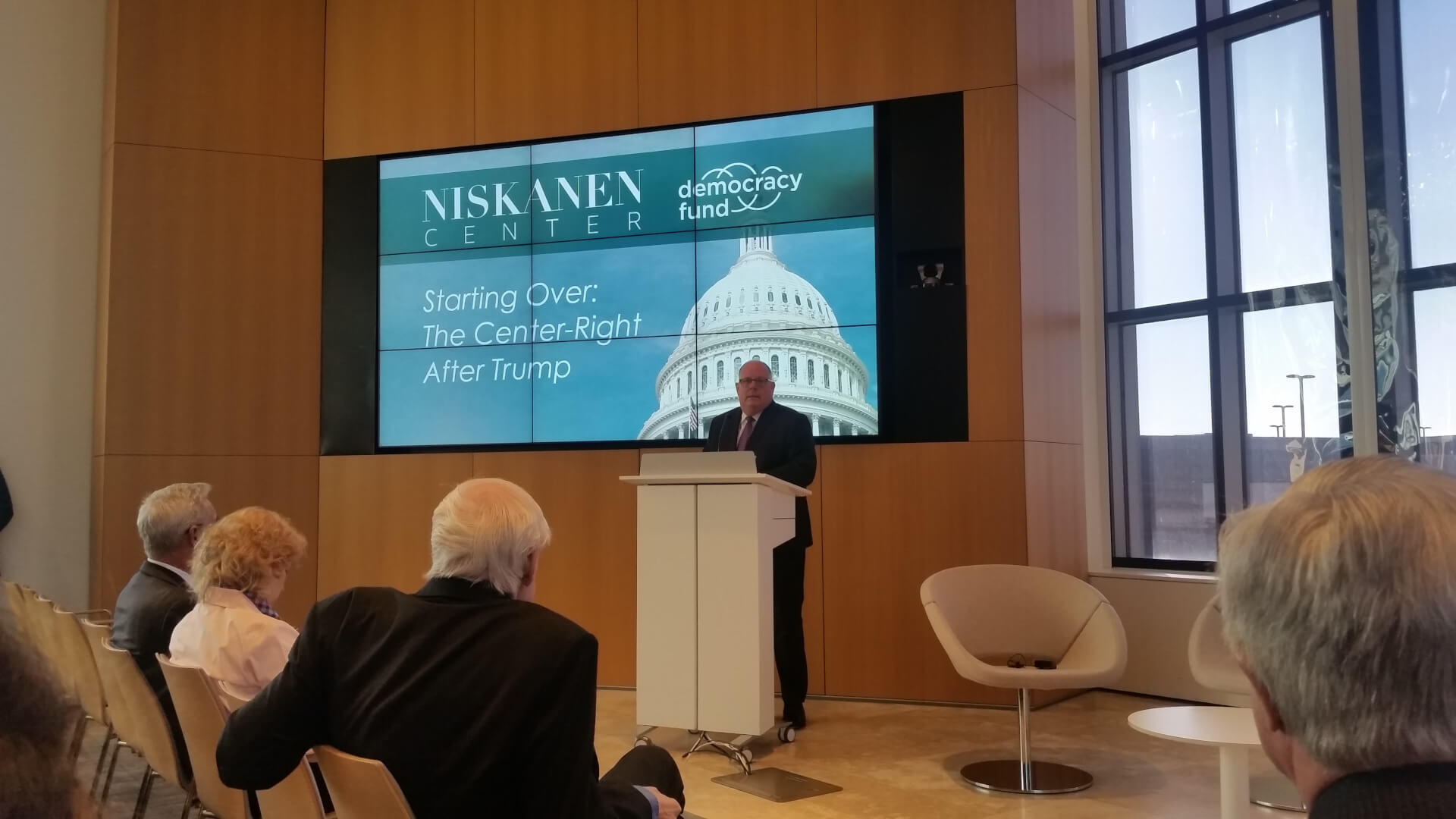Is Hogan the Antidote to Trumpism?

A leading conservative thinker on Tuesday compared President Trump to a virus – but expressed cautious optimism that “the anti-bodies will emerge.”
Could Maryland Gov. Lawrence J. Hogan Jr. (R) be the cure?
That’s certainly the hope of some center-right opinion leaders and policy experts who are disenchanted with Trump. They put Hogan’s particular brand of Republicanism on prominent display Tuesday at a daylong conference in Washington, D.C., titled “Starting Over: The Center-Right After Trump.” The event was sponsored by the Niskanen Center, a national think tank dedicated to “defending the open society.”
Hogan himself delivered the opening greetings at the conference, held on the top floor of a Capitol Hill office building with panoramic views of the city.
Hogan presented himself as an upbeat if fed-up messenger for what The New York Times recently called “the exhausted majority” – or, as he put it, “the majority in the middle.”
“I remain hopeful about America’s future,” the governor said.
To a Marylander’s ear, Hogan’s address, full of talk about bipartisanship, moderation and “common-sense solutions” along with a denunciation of partisan warfare at the national level, sounded a lot like his standard campaign speech, with a few variations and updates. But to denizens of official and intellectual Washington, it was something new and exciting.
Jerry Taylor, the president of the Niskanen Center, introduced Hogan as “a politically attractive alternative to Trump’s misgovernance.”
In an interview, Taylor, a veteran of conservative D.C. think tanks, said national anti-Trump intellectuals are excited about Hogan “because we have proof of concept here, because we have a Republican politician who can win in blue precincts and expand the base of the party without losing conservatives.”
“If you’re looking for a path that’s not Trumpist…but also politically compelling, it’s there,” Taylor continued.
Make no mistake: Even if it is populated and supported by Republicans who loathe Trump, the Niskanen Center is still pretty conservative, and its leaders are people long associated with national conservative causes. But the think tank is more than willing to go against the grain.
Taylor himself is one of the most vocal advocates on the right about the imperative of addressing climate change, and is a rare conservative proponent of a federal carbon tax, which is anathema to most Republicans.
But even as the GOP at the national level becomes dominated – rhetorically, temperamentally and in policy – by Trump and his acolytes, an increasing number of policy gurus, opinion makers and operatives on the right are vocally calling for an alternative. Many were present at the conference Tuesday, which was equal parts soul-searching, hand-wringing, finger-pointing and backward-looking.
One panel discussion, featuring pundits Mona Charen, William Kristol, Jennifer Rubin and Peter Wehner – all conservatives rooted in the Reagan era who are regular Trump critics – considered, among other things, the question of when and where conservatism ran off the rails. All lamented the absence of intellectual energy in the GOP today, especially at the national level – and all copped to not taking Trump seriously enough as his White House campaign gained momentum.
“I think 2019 is going to be the year that the Trump project is going to come crashing down,” Wehner predicted, adding that the big unknown is what comes after Trump – on the left, right and center.
“Trump is the virus,” he said. “The anti-bodies will emerge.”
With that tone and mood pulsing through the room, Hogan came in to talk about Maryland under his leadership. He began by paying tribute to President George H.W. Bush and to his late father, Lawrence J. Hogan Sr. (R), who served in Congress with Bush. He described his father’s signature vote to impeach President Nixon in 1974.
“That decision cost him dearly,” Hogan recounted. “He lost many friends, supporters and his party’s nomination for governor that year. But it was his defining moment.”
Hogan said that as governor, he has been guided by three core principles: fiscal responsibility and common sense; moderation and bipartisan cooperation; and a desire to “lead with integrity and civility.” And he said that he began laying out his hope to put Maryland “on a completely different path” than the federal government during his inaugural address in January 2015.
“I didn’t have a crystal ball,” Hogan said. “I didn’t foresee just how divided our nation had become.”
Hogan then outlined how he has met his goal of governing in a bipartisan fashion – and winning a second term resoundingly in a Democratic state.
“If we can do it, if we can solve problems with bipartisanship and common sense…in Maryland…then there’s no place in America where it can’t succeed,” Hogan said.
He continued: “These core values are the most basic of American ideals,” then said he looked forward to continuing to participate “in this important discussion.”
Speaking to reporters at a news conference in Prince George’s County later in the day, Hogan asserted that his aim at the Niskanen Center confab was to provide a glimpse of “how to fix that broken politics.”
“What I said was, we’ve provided a good example here in Maryland about being pragmatic, and we’re bringing people together instead of dividing them,” he said.
Taylor said Hogan’s potential appeal nationally is undeniable – especially at a time when 40 percent of moderate Republicans, according to data, either voted for Democrats or didn’t vote at all in the 2018 elections. These voters, he said, “matter a lot,” and he praised Hogan for being willing to call himself a moderate.
“It takes a lot of courage to do that in the Republican Party these days,” Taylor said.
As a gift, Taylor presented Hogan with the second edition of a book by Stillman Rogers called, “It Happened in New Hampshire: Remarkable Events That Shaped History.”
“In that third edition,” Taylor told the governor, “I hope there would be a chapter dedicated to you.”
Danielle E. Gaines contributed to this report.




 Creative Commons Attribution
Creative Commons Attribution